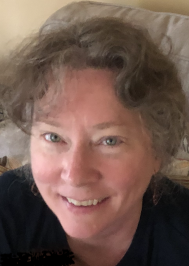UCCS’s Center for Cognitive Archaeology is pleased to announce the start of our new Student Spotlight! Each month a past CCA student will be showcased.
This month, the spotlight is on Karenleigh A. Overmann

Karenleigh A. Overmann spent her first career in the US Navy, the first 13 years as an enlisted communications specialist and the last 12 years as a commissioned officer. After retiring from the Department of Defense in 2006, she enrolled at UCCS in 2007, intending to obtain a degree in English literature. In her second year, after taking courses in anthropology and philosophy, she became a triple major. While taking the course in cognitive evolution taught by Professors Frederick Coolidge and Thomas Wynn, she was about to add psychology as a fourth major, but fortunately, asked Professor Coolidge for his opinion first. He advised her to finish her undergraduate work and take up graduate work instead. In 2010, she graduated with a bachelor’s degree in anthropology, philosophy, and English, concentrations in analytic philosophy and technical writing, and a minor in cognitive studies and began graduate work in psychology. The College of Letters, Arts and Science designated her the Outstanding Graduating Senior, Humanities.
During her master’s work, she edited three books, helped establish the UCCS Center for Cognitive Archaeology, worked as a teaching assistant for several courses in statistics for psychology, and completed the requirements to obtain a certificate in Cognitive Archaeology, the first-ever awarded by the Center. In 2013, she successfully defended her MA thesis, “Numbers and Time: A Cross-Cultural Investigation of the Origin and Use of Numbers as a Cognitive Technology.” She was also recognized as the Graduate Student of the Year, Psychological Science, by the Psychological Society of the Pikes Peak Region.
In 2013, she was accepted into the doctoral program (D. Phil.) to read archaeology at the University of Oxford, where she studied with Lambros Malafouris. She was awarded a Clarendon scholarship, which fully funds the three-year Oxford doctoral program . She received her doctorate on November 5, 2016 during the traditional ceremony held at the Sheldonian Theatre.
Since 2018, Dr. Overmann has worked at the University of Bergen, Norway, where she has a two-year postdoctoral fellowship funded by the European Union. In 2019, she published two books. The first, Squeezing Minds from Stones (Oxford University Press), is a volume of articles on cognitive archaeology co-edited with Professor Coolidge. The second, The Material Origin of Numbers (Gorgias Press), is a revised version of her doctoral thesis. Material Origin examines how the material devices used to represent and manipulate numbers—fingers, tallies, tokens, and notations—let societies realize counting sequences, arithmetical operations, and complex mathematics.
Currently, Dr. Overmann researches how societies become numerate and literate by using and modifying material forms over generations of collaborative effort, the effect this elaborational mechanism has on conceptual content, and how material forms become increasingly refined to elicit specific behavioral and psychological responses. She is currently applying these insights to stone tools. Since 2009, she has published 39 articles and book chapters, with an emphasis on numbers and writing systems. She has also written about how Neandertal cognition differed from that of Homo sapiens, as well as the literary works of Jane Austen. Recently designated an Associate Professor of Anthropology (Adjunct) for UCCS, she currently teaches two courses for UCCS’s Center for Cognitive Archaeology: The History of Cognitive Archaeology Since 1969 and Cognitive Evolution.
